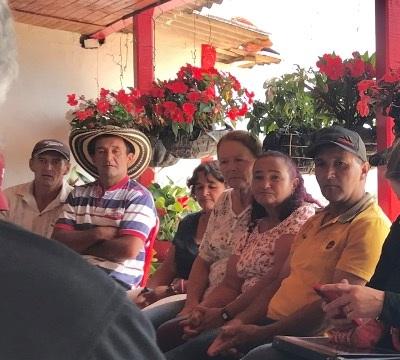A major new UK DRI Grand Challenge project, led by Prof Karen Duff, Centre Director of the UK DRI at UCL, seeks to understand the earliest stages of Alzheimer’s, by simultaneously examining molecular and cellular changes in mice and studying the very first behavioural changes in humans at risk of the disease. Through greater understanding of the underlying mechanisms of Alzheimer's, the project could lead to the development of new biomarkers to aid in early disease detection, and therapeutics to treat the condition.
The entorhinal cortex and hippocampus, regions in the brain’s medial temporal lobe, are the first to exhibit neurodegeneration in Alzheimer’s. Work pioneered by Nobel Laureate Prof John O’Keefe (UK DRI Associate Member at UCL) has identified that neurons in these regions, such as entorhinal cortical grid cells and hippocampal place cells, exhibit spatially-related activity which is thought to underpin spatial behaviours such as navigation. By studying entorhinal cortex-hippocampal function in animal models of disease, and in human cohorts, Prof Duff and her co-investigators will establish how Alzheimer’s pathology at the cellular level may result in the cognitive changes that herald the onset of dementia.
The project is multi-pronged, international, and highly collaborative
Our current biomarkers and cognitive testing capabilities are unable to detect the disease in what’s called the prodromal or preclinical phase – before symptoms appear – and it can be around ten years after changes start in the brain that the first symptoms start to show up.Prof Karen DuffUK DRI at UCL
Central to this cross-species research is the study of path integration, a form of spatial navigation akin to the ‘dead reckoning’ strategy used by sailors hundreds of years ago to navigate without the assistance of visual cues. In path integration, self-motion cues are used to update location and guide navigation back to the starting point of a journey. Grid cells in the entorhinal cortex are considered central to path integration and separate lines of research by Prof Dennis Chan (UCL Institute of Cognitive Neuroscience) and Dr Julija Krupic (UK DRI at UCL), collaborating with Prof Duff and Prof O’Keefe on this Grand Challenge, have shown that path integration is impaired in people at risk of Alzheimer’s and also in transgenic mice with mutations in genes for amyloid beta and tau.
The £1.7 million project is multi-pronged, international, and highly collaborative with, as Prof Duff aptly describes it, a ‘dream team’ of investigators with distinct areas of expertise coming together to tackle the enormous challenge of understanding what is going on in the brain at the very earliest stages of the disease, before it is currently detectable.
“One of the greatest challenges we face in Alzheimer's disease is predicting who will develop the disease and who will not,” explains Prof Duff.
“Our current biomarkers and cognitive testing capabilities are unable to detect the disease in what’s called the prodromal or preclinical phase – before symptoms appear – and it can be around ten years after changes start in the brain that the first symptoms start to show up.”
One goal of the project is to determine whether impaired path integration represents the point of transition from being at risk of Alzheimer’s to disease onset. This follows on from previous research undertaken by Prof Dennis Chan, an academic neurologist who leads the human-based work in this study.
Prof Chan explains:
“This project builds on work by my group that suggests altered navigation may be the first cognitive change in Alzheimer’s disease. We will investigate this further in two human cohorts at risk of sporadic and familial Alzheimer’s disease. By using tests based on the function of entorhinal cortex and hippocampal neurons, our approach allows us to understand how Alzheimer’s pathology at the cellular level can result in the clinical disorder.”
Uniquely, the team is investigating at-risk humans whilst simultaneously studying mouse models. This, Prof Chan explains, will generate unique insights into early Alzheimer’s that cannot be achieved in isolation.
“Our work will bridge the translational gap between mouse model work and human studies that currently represents one of the biggest barriers to progress in Alzheimer’s research,” he says.
To test the hypothesis that impaired spatial navigation is one of the first cognitive manifestations of Alzheimer’s, two human cohorts will be assessed. One is a group of asymptomatic individuals at risk of the sporadic form of the disease recruited from the PREVENT study, linked to Dementias Platform UK. In addition to the spatial testing, ultra-high resolution 7T MRI will be used to identify fine-grained changes in the structure and function of the entorhinal cortex that may be associated with altered path integration in this at-risk group.
The other cohort will be drawn from the world’s largest kindred of familial Alzheimer’s, based in Colombia, who carry a mutation in the presenilin-1 (PS1) gene that causes Alzheimer’s disease. People with the mutation develop cognitive impairment around the age of 44, dementia at around 49, and tragically pass away by around the age of 60.
Around 1200 mutation carriers are currently being studied and this UK DRI funded study will look for changes in navigation in carriers as young as age 18, to detect clinical disease onset. This arm of the project will be coordinated by Prof Francisco Lopera, Director of the Antioquia Neuroscience Group at the University of Antioquia in Medellin, Colombia.
“We have a very well-defined age of onset in this kindred, it’s very predictable, and that allows us to look at different stages of the disease and apply the test, and we can treat this almost as ground truth,” explains Prof Duff.
“There is a real synergistic benefit here, we’re excited that the Grand Challenge funding will allow one of the primary clinicians working on the kindred to spend some time in London, and for our clinicians to spend some time in Colombia to work with the kindred.”
The team recently visited Colombia to meet with Prof Lopera’s team at the University of Antioquia. They visited family members both in a nursing home setting in Medallin and also in a remote village in the Andes, accessible by helicopter, where several of the kindred live. This allowed for in-person discussion with affected family members and their caregivers, and assessment of the environment where some of the cognitive tests will be performed.

Family members of the paisa kindred in Angostura, Columbia
Alongside this, the team will be carrying out cognitive and behavioural testing in mouse models of Alzheimer’s disease being developed by Prof Karen Duff, led by Prof John O’Keefe and Dr Julija Krupic . The tests in mice will investigate progression of the disease on the function of the hippocampus and entorhinal cortex, using imaging and cognitive tests equivalent to those used in the human studies. The use of mouse models will allow the team to pinpoint exactly what is driving the behavioural changes they are testing.
Dr Krupic explains:
“We want to establish whether, in line with the most recent finding from Professor Chan, the impairment in a mouse’s ability to navigate to a goal using a path integration strategy is one of the first observed cognitive impairments in mouse models with Alzheimer’s disease pathology. Ultimately, we aim to identify which networks in the hippocampus and entorhinal cortex underly these deficits. This work in mice will help us to interpret the results we observe in human patients, design more sensitive cognitive tests associated with the preclinical stage of the disease, and finally identify potential treatment targets.”
The new anti-amyloid immunotherapies represent a breakthrough in Alzheimer’s treatment but there is increasing evidence that such drugs may be most effective when the disease pathology is least well established, underscoring the critical importance of early detection.
“What this will allow us to do, is to start to really understand the very earliest stages of the disease better, based on our understanding of the anatomical regions impacted,” explains Prof O’Keefe.
“Hopefully, at the end of this project we will have a cognitive test that is grounded in our understanding of disease mechanisms and the brain regions that they impact. Coupling this with some of the other measures already in use, like PET imaging, and biomarker testing, should significantly improve the diagnosis of Alzheimer’s, which in turn will ensure the right patients are getting access to new drugs at a stage when they can be most impactful.”
You can read more about the UK DRI’s investment in biomarker development in our Grand Challenge feature with Dr Marc Busche. Sign up to hear about updates from both projects, and all the research highlights from the UK DRI, in our monthly newsletter – Inside Eye on UK DRI.
Article published: 18 March 2024
Banner image: Shutterstock/Kateryna Kon, Karen Duff
